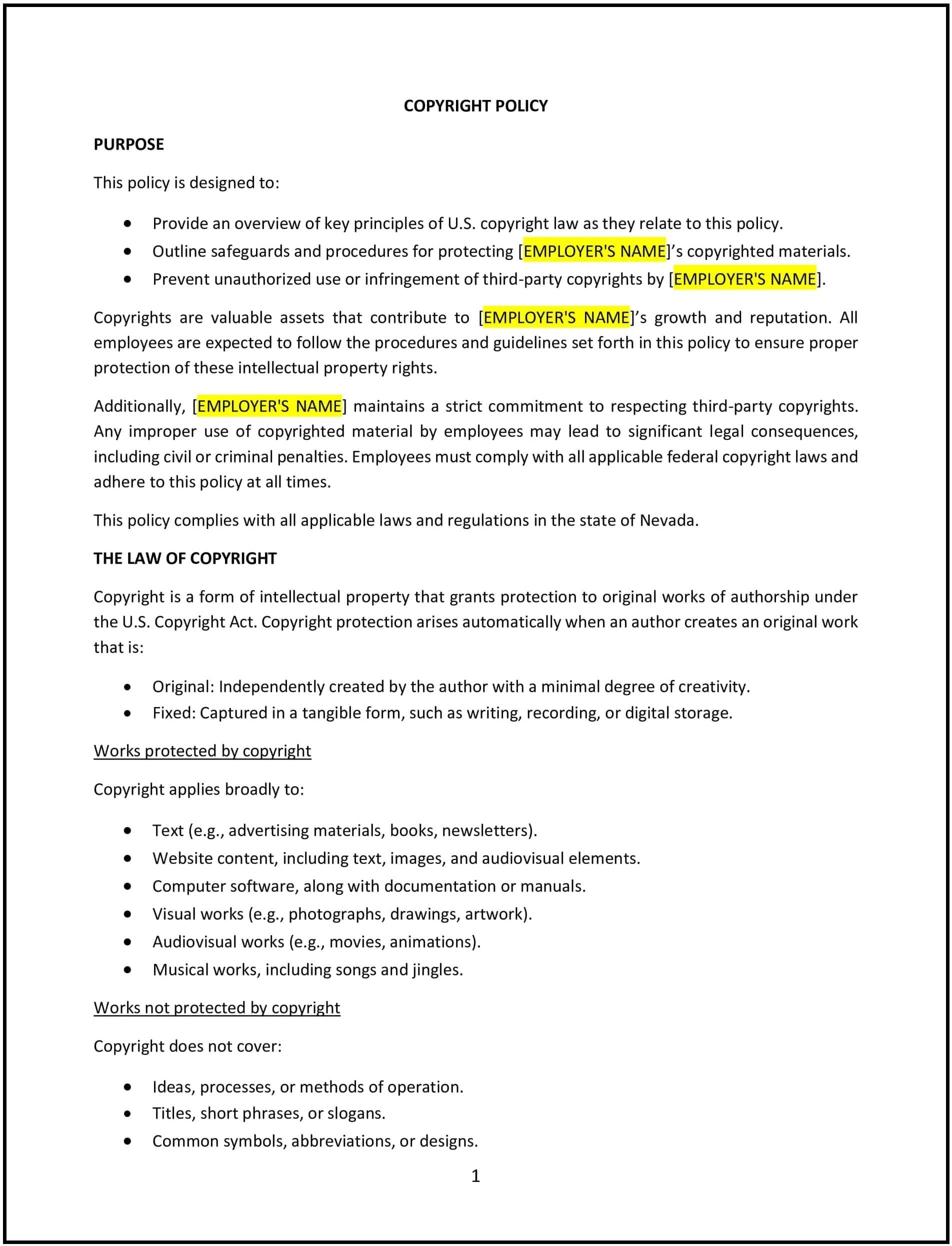Got contracts to review? While you're here for policies, let Cobrief make contract review effortless—start your free review now.

Customize this template for free
Copyright policy (Nevada)
This copyright policy is designed to help Nevada businesses protect their intellectual property, respect the copyrights of others, and strengthen compliance with applicable copyright laws. It outlines the company’s approach to handling copyrighted materials, both owned by the business and used by the business from third parties.
By adopting this policy, businesses can avoid copyright infringement, safeguard their creative works, and promote respect for intellectual property rights both within and outside the organization.
How to use this copyright policy (Nevada)
- Define copyright: Clearly explain what constitutes copyrighted material, including written works, artwork, music, software, logos, trademarks, and any other original works of authorship protected by copyright law.
- Outline company-owned copyrights: Specify what types of works created by employees during their employment are considered the company’s intellectual property and are therefore owned by the company.
- Address third-party copyrights: Outline how employees should handle third-party copyrighted works, including how to obtain proper licenses or permission to use them and how to attribute works when necessary.
- Specify employee responsibilities: Clarify employees’ responsibilities for respecting copyright laws, including not copying, distributing, or reproducing copyrighted materials without authorization.
- Set procedures for reporting violations: Provide a clear process for employees or third parties to report any suspected copyright violations, including unauthorized use or distribution of copyrighted materials.
- Outline consequences for non-compliance: Define the consequences for employees who violate the copyright policy, including disciplinary actions and potential legal consequences.
- Promote copyright education: Offer training and resources to employees to ensure they understand copyright laws and how to avoid infringement in their work.
Benefits of using this copyright policy (Nevada)
This policy provides several key benefits for Nevada businesses:
- Reduces legal risks: Establishing clear guidelines for handling copyrighted materials helps reduce the risk of copyright infringement and potential legal action.
- Protects intellectual property: Helps the company legally protect all creative works, products, and content and helps employees understand their role in safeguarding these assets.
- Encourages respect for copyrights: Promotes a culture of respect for intellectual property by ensuring employees are aware of and comply with copyright laws.
- Improves compliance: Helps the company comply with Nevada state laws and federal copyright regulations, preventing potential legal and financial consequences.
- Enhances brand protection: By securing copyrights, businesses protect their brand identity and prevent unauthorized use or duplication of their original works.
Tips for using this copyright policy (Nevada)
- Communicate the policy clearly: Ensure all employees are aware of the copyright policy and their role in protecting copyrighted materials, whether created by the company or third parties.
- Monitor use of copyrighted works: Regularly monitor the use of company-owned and third-party copyrighted works to ensure compliance with the policy.
- Educate employees: Provide ongoing education and training on copyright laws, including how to identify, obtain, and use copyrighted materials correctly.
- Review contracts with third parties: Ensure that contracts with third-party vendors, creators, or collaborators clearly define the use of copyrighted works and establish licensing or attribution requirements.
- Enforce the policy consistently: Apply the policy consistently to all employees and ensure that violations are addressed promptly and appropriately.